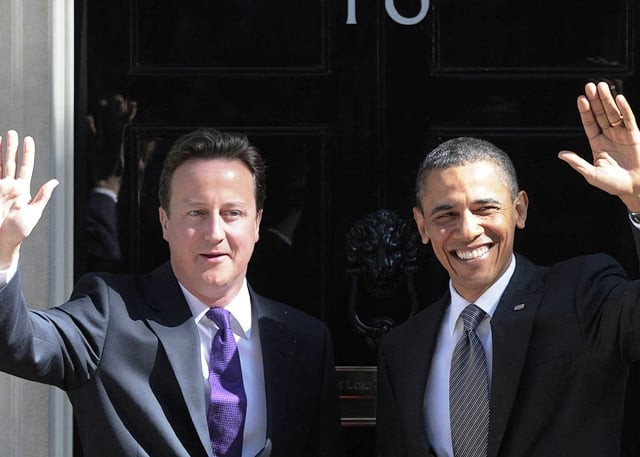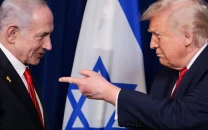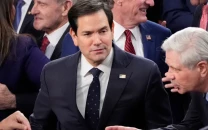Obama and Cameron "reinforce" ties
Obama and Cameron discuss US-UK relations, war on terror and Arab revolts.

Prime Minister David Cameron said at a news conference with U.S. President Barack Obama on Wednesday."Now is the moment to step up our efforts to reach political settlement. The Taliban must make a decisive split from Al Qaeda, give up violence, and join a political process that will bring lasting peace to that country. We are agreed to give this the highest priority in the months ahead."
Cameron also said the West should redouble its efforts to work with Pakistan as they seek to stamp out terrorism.
"People are asking questions about our relationship, so we need to be clear: Pakistan has suffered more from terrorism than any other country in the world. Their enemy is our enemy. Far from walking away we've got to work even more closely with them," he said.
Foreign combat troops are expected to leave Afghanistan by 2014, with Afghan security forces gradually taking over responsibility across the country.
Official sources from three countries have said that the United States has already begun talks with representatives of the Taliban, although these have so far been described as preliminary rather than substantive.
Some officials have been saying that Bin Laden's death could make it easier for the Taliban to break with Al Qaeda.
Obama rallies support in UK parliament address
In a rallying call to the Western world, US President Barack Obama on Wednesday denied that the rise of powers such as China, India and Brazil meant the inevitable decline of Europe and the United States.
In a keynote speech to Britain's two houses of parliament meant to inject new momentum into the transatlantic alliance which has bolstered global security since World War II, Obama said Western nations must renew themselves.
US, UK alliance in age of emerging super powers
"Countries like China, India and Brazil are growing by leaps and bounds," Obama told the assembled lawmakers, arguing that in the end, the emergence of new powers would benefit everyone.
"As this rapid change has taken place, it has become fashionable in some quarters to question whether the rise of these nations will accompany the decline of American and European influence around the world," he said.
"Perhaps, the argument goes, these nations represent the future, and the time for our leadership has passed. That argument is wrong. The time for our leadership is now."
Obama's speech in the historic hall has been long awaited by foreign policy experts and political leaders who have speculated that Obama believes America's future lies with emerging giants and not its old allies.
But he dismissed that idea, saying: "It was the United States, the United Kingdom and our democratic allies that shaped a world in which new nations could emerge and individuals could thrive. And even as more nations take on the responsibilities of global leadership, our alliance will remain indispensable to the goal of a century that is more peaceful, more prosperous and more just. We remain the greatest catalysts for global action."
But the president said that though the bonds between the United States, Britain and Europe were forged in two world wars, they needed to be refashioned to meet a new era of threats including terrorism and climate change.
The president also argued that nations like his own, and his hosts had an inherent advantage in a new global economy that threatens their competitive edge but which prizes a well educated workforce.
"To maintain this advantage in a world that's more competitive than ever, we will have to redouble our investments in science and engineering, and renew our national commitments to educating our workforces," Obama said.
War on terror and "Arab Spring"
Obama also praised NATO, currently fighting in Afghanistan, as the "most successful alliance in human history" and vowed to never relent in the fight against Al-Qaeda, and to ensure that Afghanistan is purged of terrorism.
He also said that the West had a crucial interest in the wave of revolt raging in north Africa and the Middle East and called on fellow leaders to help assure that political transitions succeed.
"It will be years before these revolutions reach their conclusion, and there will be difficult days along the way. Power rarely gives up without a fight," he said.
"So let there be no doubt: the United States and United Kingdom stand squarely on the side of those who long to be free," Obama said, reprising many of the themes of his major speech on the Arab uprisings last week.
"We will proceed with humility, and the knowledge that we cannot dictate outcomes abroad. Ultimately, freedom must be won by the people themselves, not imposed from without."



















COMMENTS
Comments are moderated and generally will be posted if they are on-topic and not abusive.
For more information, please see our Comments FAQ